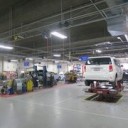NHTSA Says Vehicle Cyber Security is a Major Concern
 Today’s vehicles offer an incredible array of advanced technologies and entertainment features that work in close conjunction with things such as wireless communications, the Internet and connectivity. The National Highway Traffic Safety Administration (NHTSA) is aggressively taking on hackers and doing all it can to protect vehicles from malevolent cyber-attacks, unlawful access, or anything that relates to the vehicle's safe operation.
Today’s vehicles offer an incredible array of advanced technologies and entertainment features that work in close conjunction with things such as wireless communications, the Internet and connectivity. The National Highway Traffic Safety Administration (NHTSA) is aggressively taking on hackers and doing all it can to protect vehicles from malevolent cyber-attacks, unlawful access, or anything that relates to the vehicle's safe operation.
Here at Pride Auto Body - Corporate, we appreciate and respect all of the newest technology that currently exists in newer vehicles, so every time we see a news item about these types of topics here in Van Nuys, CA we're always happy to share this information.
So what exactly is vehicle hacking and how serious is the problem? Vehicle hacking is when a group or individual tries to gain unauthorized access to vehicle systems to retrieve driver data or altering vehicle functionality in any way. Vulnerabilities often exist within a vehicle’s wireless cellular phone or tablet connected to the vehicle through USB, Bluetooth, or Wi-Fi or within a third-party device connected to the vehicle's diagnostic port. In these scenarios, hackers remotely take advantage of these vulnerabilities and get access to the automobile's controller network or to information stored on the vehicle. Even though more vulnerabilities may not necessarily result in a hacker being able to access every system of the vehicle's systems, they can still do some major damage in a rather short time.

As serious cyber security threats to vehicles began to materialize roughly 10 years ago, the NHTSA started to focus more intently on the issue by drastically altering its overall structure based on new research and supporting the industry to improve the cyber security of vehicles in this country.
NHTSA is now concentrating more on solutions to make the electronic architecture within newer cars to fight against possible attacks and to ensure that car systems take suitable steps even after a successful attempt. A multi-layered approach to vehicle cyber security minimizes the probability of success for an attack and the potential ramifications of a successful intrusion.
Conversely, the automobile industry has a tremendous responsibility to move quickly in this safety area. Many carmakers are stepping up while others are lagging, but in the e
nd, it is something that we should all be concerned about.
The more the OEs will try to stop the hackers, the harder these shady individuals will work to beat the system and cause as much havoc as they possibly can. By being vigilant in every aspect of cyber security, we can all hopefully sleep well at night, knowing that our vehicles are safe and secure to hacking attacks.
Sources: NHTSA, US Today and Wall Street Journal














































 Today’s vehicles offer an incredible array of advanced technologies and entertainment features that work in close conjunction with things such as wireless communications, the Internet and connectivity. The National Highway Traffic Safety Administration (NHTSA) is aggressively taking on hackers and doing all it can to protect vehicles from malevolent cyber-attacks, unlawful access, or anything that relates to the vehicle's safe operation.
Today’s vehicles offer an incredible array of advanced technologies and entertainment features that work in close conjunction with things such as wireless communications, the Internet and connectivity. The National Highway Traffic Safety Administration (NHTSA) is aggressively taking on hackers and doing all it can to protect vehicles from malevolent cyber-attacks, unlawful access, or anything that relates to the vehicle's safe operation.
Social